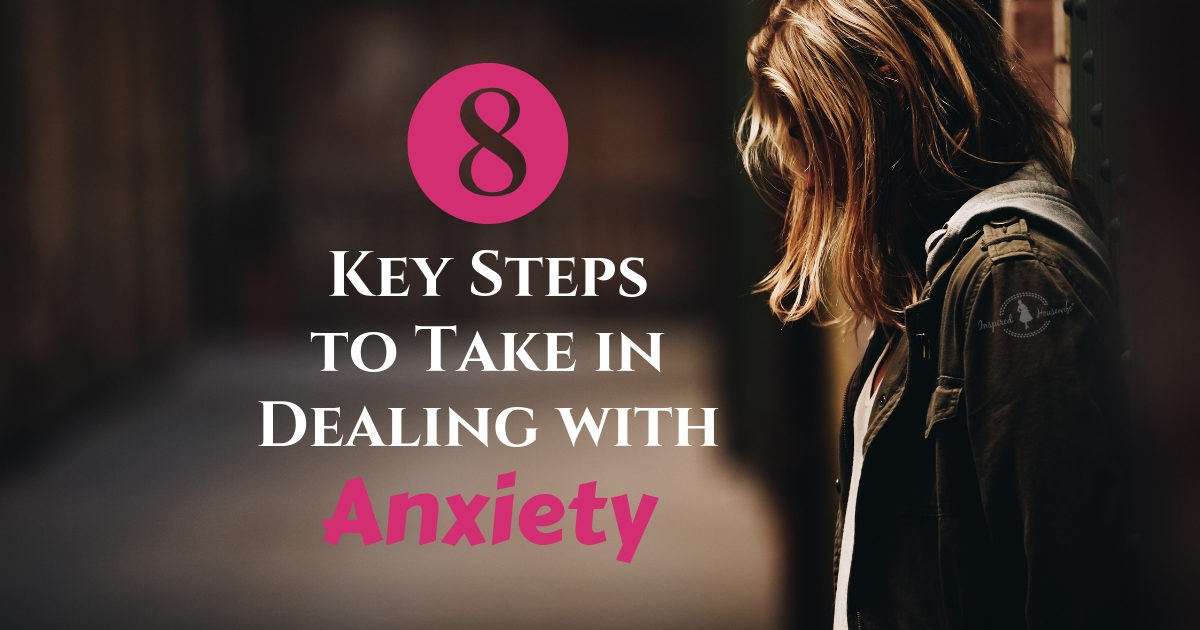As of late, dealing with anxiety rapidly rises as one of the most urgent needs of our era.
With all our time-saving gadgets, our information-age technology, and our new watered-down, subjective, and often indifferent version of social experiences, we’re facing a dilemma today previously unparalleled.
Somehow, a good portion of society is crippled by increasing stress, rather than liberated and empowered in the midst of all these technological and social “improvements.”
In the United States alone, anxiety affects an estimated 20% of adults, but experts are convinced the numbers are drastically higher.
Medically speaking, the official definition for “anxiety,” as quoted by Psychology Today, is “a state consisting of psychological and physical symptoms that are brought about by a sense of apprehension at a perceived threat.”
In other words, fear triggers and motivates your persistent anxiety, whether it’s social situations or the prospect of failing in general that discomforts or frightens you.
The question is, “Where do these fears come from?”
According to experts, fear—anxiety—is determined by your level of self-confidence.
If you think about it, this is actually a very rational explanation. We don’t just fear something because it’s fearful.

Sometimes, much of our anxiety stems from completely harmless situations, and we even admit to it despite how it makes us feel.
What we actually fear is not being prepared or capable of handling something making us uncomfortable, unhappy, nervous, weak, sad, or out-of-place.
Knowing how to build confidence (while dealing with anxiety) is the only key to unlocking the secrets of how to overcome anxiety, and that’s what I’ll attempt to set as groundwork here.
Anxiety for Women
Women are especially susceptible to anxiety.
According to the Anxiety and Depression Association of America, women are nearly twice as likely as men to be diagnosed with an anxiety disorder in their lifetime.

What’s most disturbing to note is anxiety in women generally begins at the onset of puberty.
If young, blossoming beauties don’t learn from the start how to deal with anxiety or how to overcome anxiety entirely, they’ll most-likely develop into grown women with little self-respect and self-confidence.
This only makes them targets for fresh sources of stress and anxiety.
As women, we are pulled in so many different directions. Our steadily-climbing levels of anxiety in everyday situations just make sense.
From the moment we bloom, we enter into a land of near-impossible expectations, whether they’re established by others or by ourselves.
In every arena of a woman’s life, she is compared to other women. In most cases, she does the majority of the comparing.
From physical appearance to home life to a career, we engage in behavior-affecting thinking patterns, which more often lead us closer to disappointment and failure, rather than satisfaction and success.
So, how can we become better at dealing with anxiety, and what steps can we take to rebuild our self-confidence and our overall self-respect?
Dealing with Anxiety in Your Life
This is an issue close to my heart as I’ve battled anxiety for most of my life. It wasn’t until recent years I became aware of the importance of self-love for women, especially in regards to wives and mothers (which I’ve written about in my article on why you need self love).
It takes consistency and determination to champion your right to self-care activities.
Fortunately, for those of us who do suffer anxiety—of all sources and at all levels—we can eliminate some of our triggers by making self-love a daily habit.
In many cases, anxiety results from a poorly-conducted self-care regimen, which leads us to the first step of how to overcome anxiety.
Step 1: Initiate and Maintain Self-Care
This step rises as the most important and non-gegotiable step of all. You must, without compromise, initiate and maintain self-care activities.
If you’re not sure what I’m talking about, please visit my article, titled: “How to Love Yourself By Making You the Priority.”
For many women, just sticking to an uncompromising self-care routine eradicates any anxiety-related issues, because it corrects self-destructive behavior and reinforces others’ positive regard for you.
In other words, if you stop treating yourself like trash, you’ll finally allow others to treat you like the treasure you truly are, which relieves you of a great deal of strain.

Step 2: Create Opportunities for Success
Stop setting yourself up for failure. Create opportunities for achieving success.
In the beginning, start slow.
Make it a goal to first accomplish your daily self-care regimen while meeting other daily standards and deadlines (chores, work, caring for the family, etc.).
Don’t create unreasonable “To Do” lists or take on any extra work beyond what you know you can accomplish in one day without compromising your self-care routine.
Step 3: Prepare for Situations Giving You Anxiety
Prepare yourself for intimidating situations.
Again, start slow.
Do you hate being in crowds? Find a busy coffee shop and habitually visit it. Sit and read a book there. Practice making eye contact and smiling at strangers. Make lunch dates. Begin with inviting one friend, then two, then three, then invite them to invite their friends until you’re accustomed to being in a mixed group of people you know and don’t know.
Are you afraid of speaking in public? The first rule of public speaking is: be informed. Study, examine, test yourself. If you have confidence in what you know about your topic and your target audience, then you’ve just eliminated the majority of your fear about speaking publicly!
Whatever the fear is, there are ways to acclimate and prepare yourself for situations that cause you anxiety.
Step 4: Improve Your Self-Confidence
Sometimes, breaking that barrier between fear and self-confidence is all about faking it at first.
Now, don’t get me wrong, nobody likes an disingenuous person, but that’s not what I’m talking about here.
Think of it another way.
Mountain lions are notorious for attacking people who cower and run. Any country-living soul will tell you that the best way to survive a mountain lion encounter unscathed is to stand tall and stare them straight in the eye.
Now, these cougars can weigh nearly 230 lbs., but even a small, petite woman can glare one down and give it just enough fear of its own to make it lose interest in a possible scuffle.
It’s when you run from one of these beasts that it feels the courage to hunt you down.
Take this same mentality into your daily experiences.
Sit up straight at your desk, hold your head up high, stop fidgeting, stop wiggling your legs. You are the queen of your home, act like it!
You are a deserving and highly-capable employee, raise your chin, hold your shoulders back.
Give firm handshakes, look people in the eye, smile.
If you exude physical confidence, you’ll not only convince those around you, you’ll also start convincing yourself.
Don’t believe me? Check out this 2009 study on body posture: “Body Posture Effects on Self-Evaluation: A Self-Validation Approach.”
Step 5: Start and Finish Tasks with a Purpose
Be purposeful about starting and finishing tasks. Don’t just float through a day—be focused.
Adhere to your routines, but resolutely explore new interests. If a new experience sparks anxiety, push through it.
Even a hobby can be frustrating and stressful. Are you knitting a scarf that will clearly turn out misshapen and ugly?
Doesn’t matter. Push through, finish it.
Start a new creation.
In most cases, you don’t need to be an expert at anything you do, but you should finish what you’ve started because it teaches you how to be patient, which is a major component to how to build confidence.
Step 6: Speak and Think Positively about Yourself
Speak kindly and positively to yourself. Stop ripping yourself up.
Why do you talk so nastily to yourself?
Yes, your past choices are the reason some things have gone wrong.
Yes, you are capable of making yourself and others unhappy.
Yes, you contributed to failure in the past.
Nonetheless, from here on out, you’re to zip it unless you have something nice to say or think about yourself.

Negative self-talk reinforces persistent feelings of anxiety, because it induces low self-esteem and self-confidence.
You need to make it a habit to remind yourself of your value.
No, I’m not talking about how others convey your value. If you’re a mother or a wife, you definitely experienced times when your children or your spouse don’t appreciate you.
This is not the measure by which you make a conclusion about your worth. You decide your worth.
Start by building yourself up, not tearing yourself down.
Pay attention to your skills, your talents, your accomplishments, your fun quirks, your convictions, and your virtues.
You are someone worthy of love, worthy of respect, and worthy of life and all it can offer.
Don’t let anyone convince you otherwise, especially yourself!
Step 7: Make Good and Supportive Friends
Make friends, even if they’re just friendly acquaintances placed within specific boundaries, such as work environments, school events, etc.
Enlarge your circles.
You don’t need to share every sordid detail of your life.
You don’t need to become besties with each and every one of them, but be willing to enjoy the company of someone you’re not particularly close.
Knowing more people and making positive experiences with them increases your self-confidence, and equips you with a naturally uplifting support group, and encourages you without letting others know you secretly need it.
Step 8: Avoid Procrastination and Instead Be Proactive
Putting tasks off until the last minute not only sets you up for failure, but it will just make you more tense and worried while you’re trying to focus on other things.
As much as you can, start and finish a task with an approaching deadline as quickly as you can.
In Closing
Dealing with anxiety is challenging. I understand you live a busy life, so start by maintaining just the daily self-care routine.
If you commit to self-love activities at the start of each day (such as a balanced breakfast, some exercise, and a shower), you’ll be fully equipped to handle the day’s burdens and anything else suddenly popping up.
You can accept an impromptu visit from a friend.
You can make time for that phone call you to which you weren’t looking forward.
You don’t need to put off the things making you nervous just because they make you nervous.
If you approach the day with behavior saying, “I deserve success,” then you can tackle anything, regardless of your fears.
With all of this said, if you currently experience anxiety so intense and crippling you truly cannot function on any given day, you need to consult with your physician, who may or may not decide to direct you to a psychiatrist.
In some cases, an underlying health issue causes your anxiety, such as an autoimmune disorder.
Whatever the case might be, whether it’s physical or psychological, be rest assured it is treatable, and there are people who genuinely care for your well-being.
If you need professional help, you must still teach yourself and practice the things discussed here.
So, review these steps on how to overcome anxiety, and make plans beyond the possibility of counseling and medication.
You deserve to maintain authority over yourself and your own life.
Receiving professional help is only part of that process.
Learning how to best overcome anxiety depends on your ability and willingness to take these key steps.
The end result of dealing with anxiety is peace within your life.
